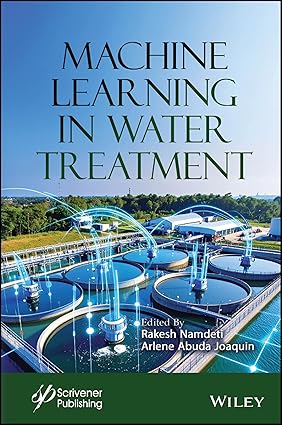
Machine Learning in Water Treatment
Author: Rakesh Namdeti (Author), Arlene Abuda Joaquin (Author)
Publisher finelybook 出版社: Wiley-Scrivener
Publication date: 2025-10-21
Edition 版本: 1st
Language 语言: English
Print length 页数: 784 pages
ISBN-10: 1394303491
ISBN-13: 9781394303496
Book Description
Machine Learning in Water Treatment is a must-have for anyone interested in how artificial intelligence is transforming water treatment, offering practical insights, case studies, and a deep dive into cutting-edge machine learning techniques that can improve water quality management.
Machine Learning in Water Treatment explores the complex fields of wastewater treatment and water purification, offering a thorough analysis of the cutting-edge machine learning methods used to solve problems with water quality control. It provides insights into how artificial intelligence can be incorporated with conventional procedures, bridging the gap between conventional water treatment techniques and state-of-the-art data-driven solutions. The book will cover the foundations of water treatment procedures, providing insights into the ideas behind physical, chemical, and biological treatment modalities. Difficulties in managing water and wastewater quality are paving the way for the use of machine learning as an effective tool for control and optimization.
Fundamentally, the book explains how machine learning models are used in water treatment system control, optimization, and predictive modeling. Readers will learn how to take advantage of machine learning algorithms’ potential for real-time treatment process optimization, quality issue identification, and water pollutant level prediction through a thorough investigation of data collection, preprocessing, and model creation. Case studies and real-world applications provide insightful information about the application of machine learning technologies in a variety of scenarios. With its unique combination of theoretical understanding and real-world applications, this book is an invaluable tool for understanding how water quality management is changing in the age of data-driven decision-making.
From the Back Cover
Machine Learning in Water Treatment is a must-have for anyone interested in how artificial intelligence is transforming water treatment, offering practical insights, case studies, and a deep dive into cutting-edge machine learning techniques that can improve water quality management.
Machine Learning in Water Treatment explores the complex fields of wastewater treatment and water purification, offering a thorough analysis of the cutting-edge machine learning methods used to solve problems with water quality control. It provides insights into how artificial intelligence can be incorporated with conventional procedures, bridging the gap between conventional water treatment techniques and state-of-the-art data-driven solutions. The book will cover the foundations of water treatment procedures, providing insights into the ideas behind physical, chemical, and biological treatment modalities. Difficulties in managing water and wastewater quality are paving the way for the use of machine learning as an effective tool for control and optimization.
Fundamentally, the book explains how machine learning models are used in water treatment system control, optimization, and predictive modeling. Readers will learn how to take advantage of machine learning algorithms’ potential for real-time treatment process optimization, quality issue identification, and water pollutant level prediction through a thorough investigation of data collection, preprocessing, and model creation. Case studies and real-world applications provide insightful information about the application of machine learning technologies in a variety of scenarios. With its unique combination of theoretical understanding and real-world applications, this book is an invaluable tool for understanding how water quality management is changing in the age of data-driven decision-making.
About the Author
Rakesh Namdeti, PhD is a lecturer in the Department of Chemical Engineering at the University of Technology and Applied Sciences, Salalah. He has over 20 publications, including book chapters and articles in international journals of repute. His research interests include chemical processes, separation technology, and petroleum refining.
Arlene Abuda Joaquin, PhD is lecturer in the Department of Chemical Engineering at the University of Technology and Applied Sciences, Salalah. She is credited with over 15 publications, including book chapters and articles in international journals. Her research focuses on water and wastewater treatment, water quality, and environmental pollution.
 finelybook
finelybook
